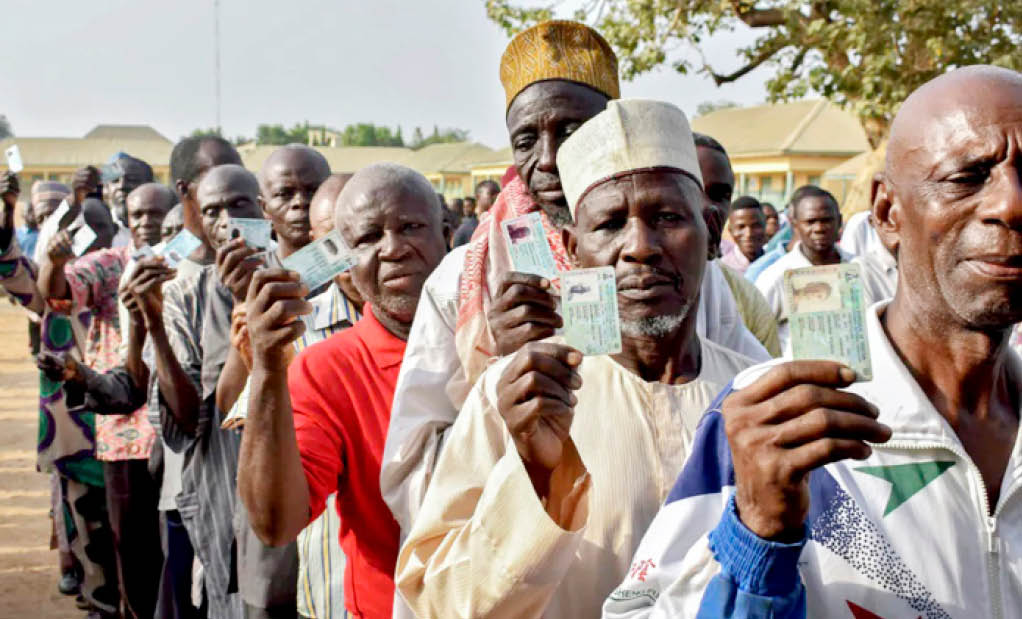A coalition of Civil Society Organisations (CSOs) has demanded that President Muhammadu Buhari sign the Electoral Bill 2022 by next Tuesday 22nd February to prevent a constitutional logjam that may negatively impact the 2023 General Elections.
The CSOs made the demand on Friday in Abuja at a joint press conference.
- Travellers stranded as truck drivers block road in Jigawa
- Julius Berger donates N56m to HIV Trust Fund in Nigeria
The Convener of the Nigeria Civil Society Situation Room and Country Director of Action Aid Nigeria (AAN), Ms Ene Obi, who read the position of the coalition, said that on the 31st January 2022, the National Assembly transmitted the Electoral Bill 2022 to the President for assent after expeditiously reworking the bill to meet the President’s expectations.
She said that the accelerated recommittal and eventual passage of the bill by the National Assembly in line with citizens’ demand deserve commendation.
“We note the provision of Section 58(4) of the 1999 Constitution, which gives the President a timeline of 30 days to assent or withhold assent to a Bill.
“However, a combination of the newly introduced timelines for electoral activities in the bill and imperative for INEC and other stakeholders to commence early preparations for the upcoming elections provides a compelling justification for immediate assent of the bill.
“For instance, Clause 28 (1) of the Electoral Bill 2022, requires INEC to issue Notice of Election not later than 360 days before the day appointed for an election.
“As indicated by INEC, the scheduled date for the 2023 Presidential and National Assembly election is 18th February 2023.
“Therefore, the Notice of Election for the 2023 general election should be issued on 22nd February 2022 because the total number of days from 22nd February 2022, to 17th February 2023, is 360 days,” Obi said.
Executive Director of Yiaga Africa, also speaking, said that if the President gives assent to the bill on or before February 22nd, 2022, INEC will be legally bound to issue a Notice of Election, and the dates for the 2023 elections will be maintained.
“However, if the President acts on the bill after 22nd February 2022, the dates for the 2023 election and other subsequent electoral activities will be affected,” Itodo said.
The coalition said that the civil society community was deeply concerned with the delay on the part of the President to give assent to the bill despite the resounding clamour for the speedy conclusion of the amendment process to avert legal uncertainties that will certainly occasion logistical, financial, and programmatic difficulties that threaten the integrity of the off-cycle elections in Ekiti, Osun and the 2023 general election.
“Our concerns are further heightened with the President’s delay in fulfilling a promise he made to Nigerians during an interview on national television indicating he will assent to the Electoral Bill if the National Assembly reworks the bill and expands the procedure for nomination of candidates,” they said.
They also noted that President Muhammadu Buhari has declined assent to amendments to the Electoral Act on five occasions in the last five years.
According to them, in March 2018, President Buhari rejected the bill due to some provision that would usurp INECs powers on electoral matters; in July 2018, he outrightly vetoed the Bill by refraining from making comments on the Bill until the expiration of the 30 days’ timeline.
Also in September 2018, he rejected the Bill on the basis of drafting errors and cross-referencing gaps.
In December 2018, he rejected the Bill because it was too close to the 2019 General Election.
“Lastly, he rejected the current Bill in December 2021 based on the adoption of direct primaries as the only legally approved procedure for the nomination of candidates.
“If the current Electoral Bill suffers the same fate, it will amount to a subversion of popular will and national interest,” they said.
The coalition said that as the nation prepares for the off-cycle governorship elections in Ekiti and Osun and the 2023 general elections, a new legal framework is required to safeguard the integrity of these elections.
They said that the current Electoral Bill 2022 contains provisions that address electoral manipulation and the intractable problem of poor election logistics, and also that the bill strengthens INEC’s financial independence.
They, therefore urged President Buhari to, upon return from Brussels, sign the Electoral Bill into law on or before 22nd February 2022 to enable INEC to issue a Notice of Election and release the timetable and schedule of activities for the 2023 general election.
They added that further amendments to the Electoral Bill 2022 can be proposed after assent has been granted as it is within the President’s prerogative to propose amendments after signing the bill as he did in the case of the Petroleum Industry Bill (PIB) and 2022 Appropriation bill, an act which attracted commendation.
They also urged the National Assembly to ensure that the gazetted copies of the Electoral Act 2022 are available to citizens as soon as the bill is signed into law.
The members of the coalition are Nigeria Civil Society Situation Room, Yiaga Africa, Partners for Electoral Reform (PER), International Press Centre (IPC), Institute for Media and Society (IMS), Nigerian Women Trust Fund (NWTF), The Albino Foundation, Centre for Citizens with Disability (CCD), Premium Times Centre for Investigative Journalism (PTCIJ), Transition Monitoring Group (TMG), and CLEEN Foundation.
Also are Civil Society Legislative Advocacy Centre (CISLAC), Labour Civil Society Coalition (LASCO), Women Advocates Research and Documentation Centre (WARDC), Nigeria Network of Non-Governmental Organizations (NNNGO), and Inclusive Friends Association (IFA).
Others are Enough is Enough (EiE), The Electoral Hub, Centre for Liberty, Take Back Nigeria Movement, International Peace and Civic Responsibility Centre (IPCRC), 100 Women Lobby Group and Women in Politics Forum (WIPF)

 Join Daily Trust WhatsApp Community For Quick Access To News and Happenings Around You.
Join Daily Trust WhatsApp Community For Quick Access To News and Happenings Around You.

